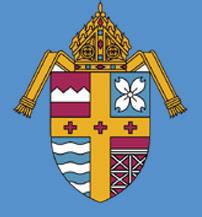
6 minute read
Bishop Stika presides at special Mass for Renzo Alvarado Suarez, who will join diocese
By Beth Parsons
Celebrations occurred across several countries as the Diocese of Knoxville gained a new transitional deacon. On Jan. 22, Deacon Renzo Alvarado Suarez was ordained by Bishop Richard F. Stika at Seminario Hispano de Santa Maria de Guadalupe in Mexico City.
In attendance from Deacon Alvarado’s home country of Colombia were his mother, Abigail Suarez de Alvarado, and a close family friend, Itala Caiafa. Participating in the Mass from Knoxville, in addition to Bishop Stika, were Father David Boettner, vicar general and rector of the Cathedral of the Most Sacred Heart of Jesus; Father Arthur Torres, associate vocation director for the Diocese of Knoxville and pastor of Our Lady of Perpetual Help Parish in Chattanooga; and Deacon Sean Smith, chancellor for the Diocese of Knoxville.
Knoxville seminarian Abrahan da Silva, who studies at Seminario Hispano with Deacon Alvarado, also attended along with priests and seminarians from the Mexico to the promised land of heaven,”
Father Bradley said.
Septuagesima Sunday traditionally marked the beginning of some of the more somber practices that characterize the season of Lent — it was the day when the saying or singing of “Alleluia” would be suspended until Easter, and the first day that priests would wear penitential purple vestments. The last alleluias would traditionally have been sung after Vespers the previous night.
In ordinariate communities, the “goodbye” to the Alleluia takes place on the Sunday before Septuagesima, when the hymn “Alleluia, Song of Gladness” is traditionally sung, Father Bradley said.
“This is an English translation of an 11th-century hymn, wishing ‘farewell’ to the Alleluia, which disappears from the liturgy until Easter, replaced instead by a Tract [verses typically of the Psalms sung instead of the ‘Alleluia’],” he said.
“The idea of ‘burying the Alleluia’ for the length of these penitential seasons is taken one step further in some places, where a depiction of the Alleluia is literally buried until the chanting of the great Paschal Alleluia during the Vigil in the Holy Night of Easter,” he added.

Septuagesima was also, in the early Church, the beginning of the Lenten fast, since according to the old liturgical calendar, Thursdays and Saturdays, in addition to Sundays, were days that Christians would not fast.

“Just as Lent today begins 46 days before Easter, since Sundays are never a day of fasting, so, in the early Church, Saturdays and Thursdays were considered fastfree days. In order to fi t in 40 days of fasting before Easter, therefore, the fast had to start two weeks earlier than it does today,” Catholic author Scott P. Richert noted in a 2018 article for ThoughtCo
Farewell to meat, cheese, fun
Septuagesima Sunday traditionally kicks off a season known by various names — Septuagesimatide, or Carnival (typically the name for more worldly celebrations during this time), or ShroveTide (particularly in Anglican traditions). The point of the season, Father Bradley said, is to prepare well for Lent.
“St. Paul VI is said to have described the progressive move toward Lent in Septuagesima, Sexagesima, and Quinquagesima, like church bells that call the faithful to worship, 15, 10, and 5 minutes before Mass,” Father Bradley said.
City seminary. Many others were able to watch the live-streamed Mass.
The procession started outside of the seminary chapel, appropriately named Our Lady of Guadalupe. The chapel is used by the seminarians to pray the Liturgy of the Hours and attend daily Mass.
The rite of ordination followed the Gospel reading, where Deacon
“Each week in the lead-up to Lent is a nudge that the great and holy fast is around the corner, and our preparations for this should intensify.”
These days were also practical for Christians in pre-refrigeration days — they would use the preLenten season to use up the rich, perishable foods such as meat and cheese that they had in their house before Lent began, and the unused foods would spoil, Michael P. Foley, Catholic author and associate professor of patristics at Baylor University, noted in a 2011 article.

Days of preparation for Lent are also found outside the Roman liturgical traditions, Father Bradley said.
“For example, in the East Syrian liturgy (as celebrated by the Syro-Malabar Catholic Church), the week before Septuagesima is marked by Moonnu Nombu, which recalls Jonah remaining three days in the belly of the whale. Moonnu Nombu is a short three-day fast, in preparation for the coming major fast of Lent.”
In Byzantine and Orthodox traditions, they even have designated “meatfare” and “cheesefare” Sundays, which focus on clearing the house of meats and dairy, respectively.
“Similarly, in Russia and other Slavic countries, the week before Lent is called ‘Butter Week’; in Poland it is called ‘Fat Days,’” Mr. Foley noted.
Carnival is the term for the more festive, worldly events associated with the pre-Lenten season and is celebrated throughout the world with parades, parties, and feasts. Still, the word itself is Catholic in origin, coming from Latin carnem levare ( carnelevarium ), which means “withdrawal” or “removal” of meat, according to The Easter Book by Father Francis X. Weiser, SJ.
The intensity of some Carnival celebrations comes from the intensity of the fasting of old, which was much more restrictive than it is today, Father Weiser noted.
“The intensity of this urge, however, should not be judged to stem from the mild Lenten laws of today but from the strict and harsh observance of ancient times, which makes modern man shiver at the mere knowledge of its details. No wonder the good people of past centuries felt entitled to ‘have a good time’ before they started on their awesome fast,” he said.
“Carnival music” has Spanish, Portuguese, Native American, and African infl uences and is typically associated with the regions of the Caribbean and Brazil, which has some of the largest Carnival celebrations in the world.
Alvarado was called by name to stand before the bishop, to which he replied, “present.”

Bishop Stika began his homily by recounting the last words of Pope Benedict XVI, “Jesus, I love you.” The bishop went on to say, “and just a few moments ago when Renzo said ‘present,’ in a way, he said the same thing because that word ‘present’ means that he brings his
“Though it varies from country to country, Carnival music has a common origin in bidding a fond farewell to fun before the 40-day fast of Lent,” Mr. Foley noted.
One last chance: Mardi Gras
The last day before Ash Wednesday, the offi cial start of Lent, is called Mardi Gras, Fat Tuesday, or Shrove Tuesday, depending on the country or region.
“Mardi Gras” is French for Fat Tuesday, the biggest celebrations of which in the United States take place in New Orleans, with parades and parties on Bourbon Street and throughout the city.
Besides being the last day to clear the house of indulgent foods, it is also traditionally the last day whole life to this moment.”
The bishop’s homily focused on new responsibilities for Deacon Alvarado: “to be a witness to the people you serve in acts of charity and kindness, nourish them in catechetical teaching, witness a marriage and bury the dead, pray the Liturgy of the Hours, and live a life of celibacy.”

Bishop Stika shared that the ordination rite includes a “beautiful taking of yourself and giving of yourself to the Church.”
“We will hear the Litany of the Saints, in which you abandon yourself to the Church and ask for their prayers, the Church triumphant, those who have gone before us marked with the sign of faith,” Bishop Stika said. “Pray for those who brought you to this moment: the first seminary of your mother, father, and family, and all your friends, and all those people who prayed for vocations; pray for them.”
Bishop Stika concluded his homily by telling the priest-in-training that after the post-ordination Mass reception, “Your work continues.
Deacon continued on page A10 to clear the soul from sin before the start of the Lenten season. According to Father Weiser, the name “Shrove Tuesday,” typically more common in Anglican areas, was thus called because it was a day to be “shriven from sins.”
The ubiquitous pancake breakfasts, most often associated with parish breakfasts sponsored by the Knights of Columbus in the United States, may also have their origins in Shrove Tuesday, as pancakes were a traditional English food served on the day to rid the house of any last sugar, butter, and eggs.
Lent this year, which began on Feb. 22, ends on Holy Thursday, April 6. Good Friday is April 7, and Easter Vigil is Saturday, April 8, with Easter Sunday on April 9. ■










